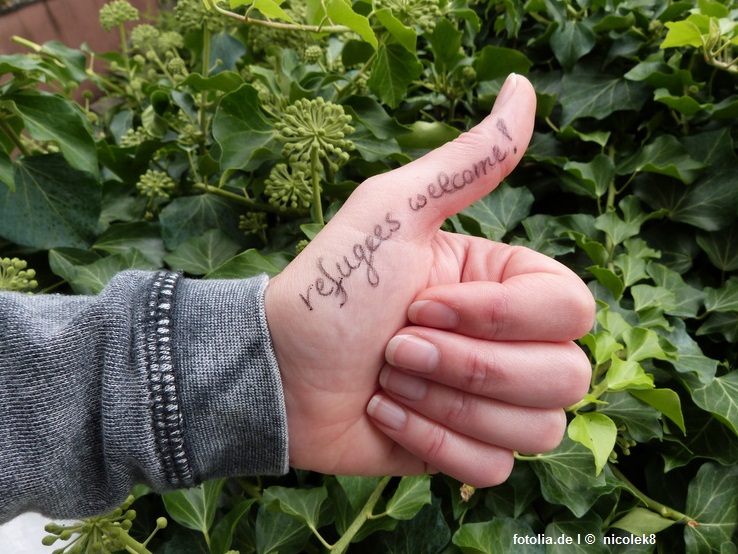LGBT refugees may have escaped persecution and oppression in their country of origin, but they are still far from being able to live freely and openly as gay or lesbian people in Germany. The film is about homophobia in refugee homes and the ways in which the community can help.
Anyone who comes out (or is outed) as gay, lesbian or trans* in a refugee centre must expect bullying and sometimes even physical attacks. Homophobia is unfortunately widespread among the residents of the refugee centres. Jouanna, the social manager of the LSDV Berlin-Brandenburg, knows many such cases. Time and again, those affected turn to her for help. Sometimes she manages to get a single room in the accommodation by talking directly to the management. But this rarely works.
This makes it all the more important in such cases to find a bed for LGBT refugees away from the collective accommodation: for example, as subtenants with private individuals or as flatmates. Jouanna is already working successfully with the "Refugees welcome" accommodation platform The project is a joint endeavour, but the decisive factor is the involvement of people from the community who want to take refugees into their homes. In this way, Halim* was also spared being relocated to Mecklenburg-Vorpommern. He now lives as a regular subtenant in a room in the flat of a gay American Berliner by choice.
The counsellors in facilities such as the Munich Gay Culture and Communication Centre (SUB) or the Berlin AIDS service organisation are undoubtedly overburdened with the high number of people seeking help. But not everyone who arrives in Germany is traumatised by war, terror and torture - like many Syrians, for example. Not all African people are completely overwhelmed by the Western world. Sascha from SUB warns against "generalising refugees into poverty", as he puts it. "Highly qualified gay men come to me who have worked in global companies in Africa, but were then outed and lost their jobs as a result". Nevertheless, it will not be easy to get them back into their jobs here quickly. But not all refugee biographies automatically end in excessive demands or disaster," Sascha knows from his own experience.
Like Demba*, for example. The gay man is a craftsman and had never attended secondary school in his African homeland. Thanks to a donation, the SUB was able to organise a language course for him at the Goethe-Institut in Munich. "After just three months, we were able to hold our counselling sessions in German," reports Sascha. A number of steps had to be taken to find him a job in his profession, but Demba was ultimately lucky. He is now a recognised refugee and has already been promoted to branch manager in his company. "There are stories like that too," says Sascha.
First and foremost, asylum seekers simply need contact with other people.
But asylum seekers who don't know anyone in this country, who receive no support from other people or institutions and who have no social worker or lawyer at their side in emergencies, have a bad start.
Some may experience something sexually, but in case of doubt they serve as a fetish and sexual object due to their dark skin colour or Russian origin. But then there is no more interest in them. The emotional wounds and disappointments are correspondingly deep. "They have left everything behind in their home country and have endured great hardship," says Sascha. They have high hopes of at least being accepted by the gay scene here or even learning to deal with their homosexuality." All of this is ruined by this kind of behaviour.
It doesn't take much to show LGBT refugees that they are welcome here and to make it easier for them to start their new lives. First and foremost, they simply need contact with other people. Sascha would therefore like to see support groups formed specifically for LGBT refugees, who can show the new citizens around the city and the scene, support them with visits to the authorities and learn German with them, for example. "You don't have to be a psychologist to do this, you just need to have a warm relationship," says Sascha. This would also significantly reduce the workload of the full-time helpers at the advice centres. Instead, they could take better care of the more complicated cases that require professional support.
In Munich, queer associations and organisations are already working together to collect ideas on how to make it easier for refugees to join the community. For example, they are considering waiving club fees for refugees, as well as other people in social need, to enable them to become members of gay and lesbian sports clubs. Refugees are already granted free entry to some lesbian or gay parties.
At least as important as allowing LGBT refugees to participate in life is also giving them the opportunity to learn the German language. The SUB as well as the Berlin Centre for Migrants, Lesbians and Gays (MILES) therefore offer special language courses for queer asylum seekers with lesbian or gay teachers - always assuming that the costs for the teaching materials and lessons can be financed.
So if you want, you can also make a small or even larger contribution to the queer welcoming culture and donate money.
*Names changed by the editors










